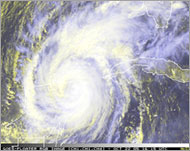2005 costliest storm year, insurer says
With devastating Hurricanes Katrina and Wilma in the Americas and never-before-seen hurricanes approaching Europe, the world in 2005 will show the highest-ever financial losses for weather-related natural disasters.

Economic losses globally will exceed $200 billion and insured losses will be more than $70 billion, according to preliminary estimates released on Tuesday by the Munich Re Foundation, part of a leading reinsurance company.
Katrina inflicted damage of $125 billion in the southern United States, including more than $30 billion in insured losses.
This year will trump 2004, the previous record year with global economic losses of $145 billion and insured losses of $45 billion.
The record-breaking losses were announced on the sidelines of the United Nations conference to tackle global warming, which many scientists blame for the destructive weather patterns of recent years.
“There is a powerful indication from these figures that we are moving from predictions of the likely impacts of climate change to proof that it is already under way,” said foundation head Thomas Loster.
The foundation’s full findings will be published in early 2006.
Record-setting year
2005 stood out not only for losses, but several firsts on the weather front. Wilma was the strongest recorded hurricane, and Vince was the first hurricane to approach Europe, making landfall in Spain in October.
 |
|
Wilma, the most intense hurricane |
In 2004, the southernmost hurricane was recorded in Brazil.
“A scientist would have laughed at you 10 years ago if you said there were going to be hurricanes in Brazil or hurricanes making landfall in Spain,” Loster said.
Insurers say higher ocean temperatures linked to global warming are changing their risk situation.
“This creates new risk in new areas, and the people in these areas are not prepared,” Loster said.